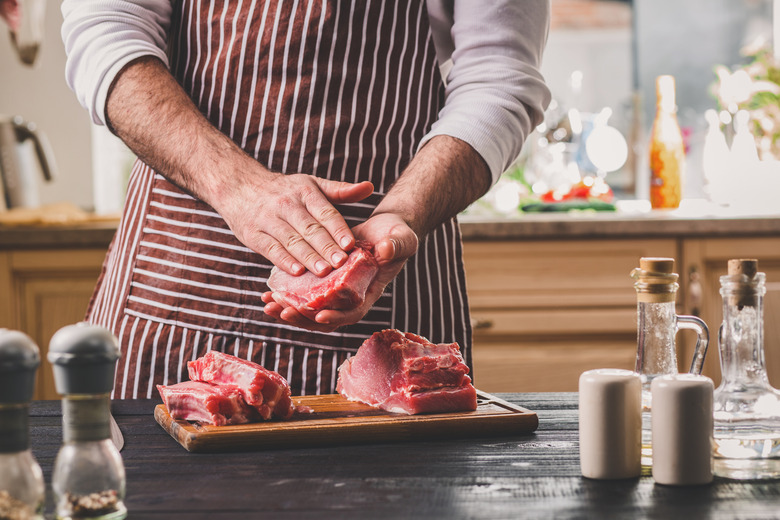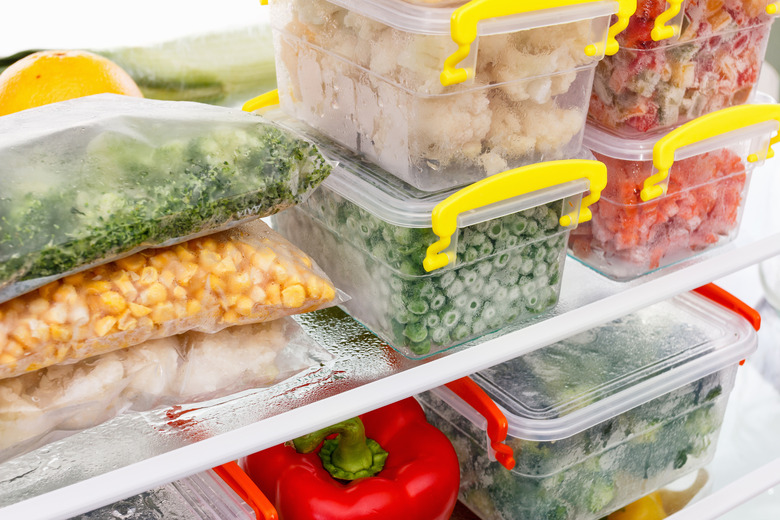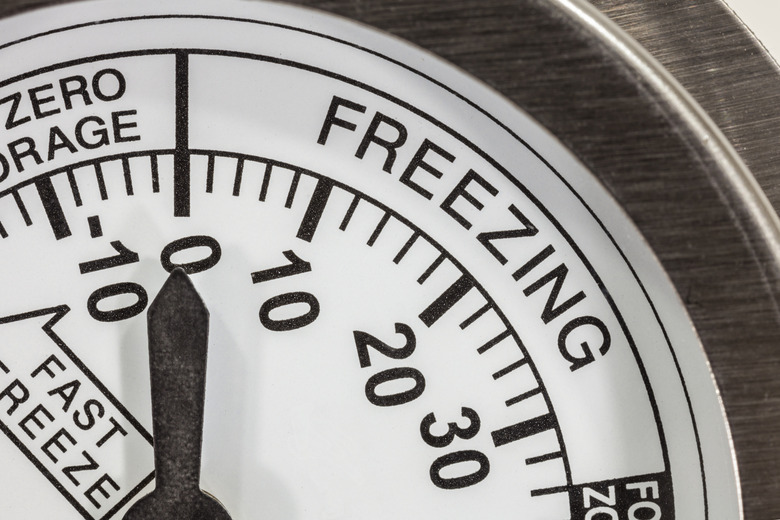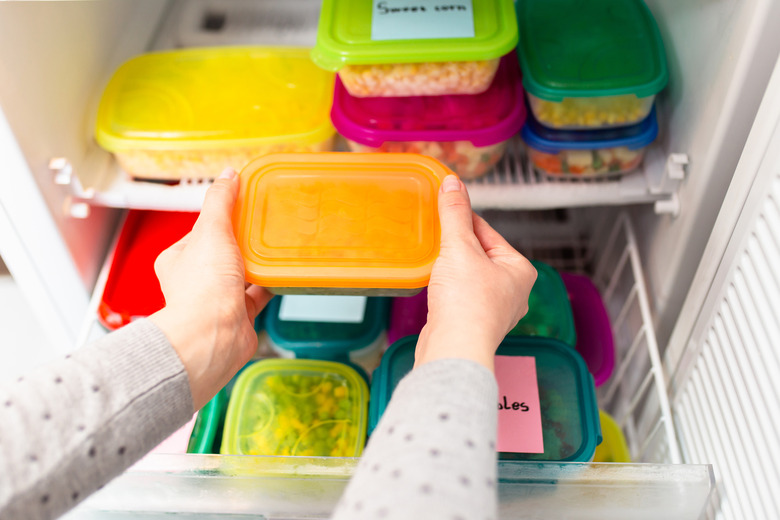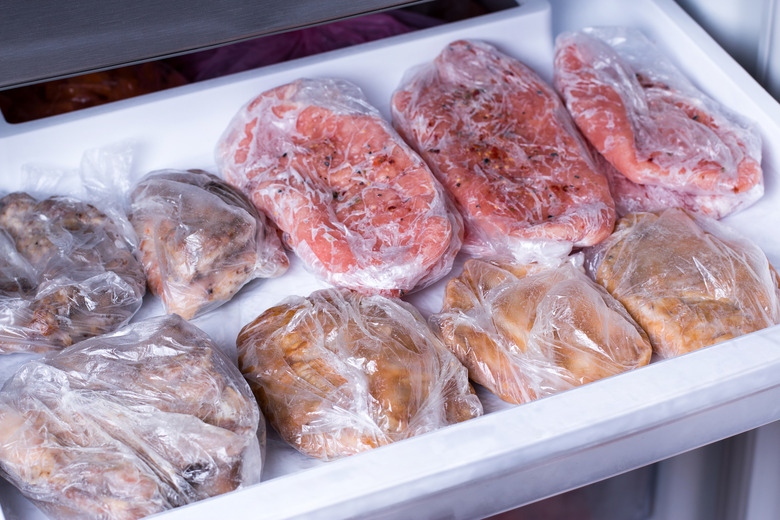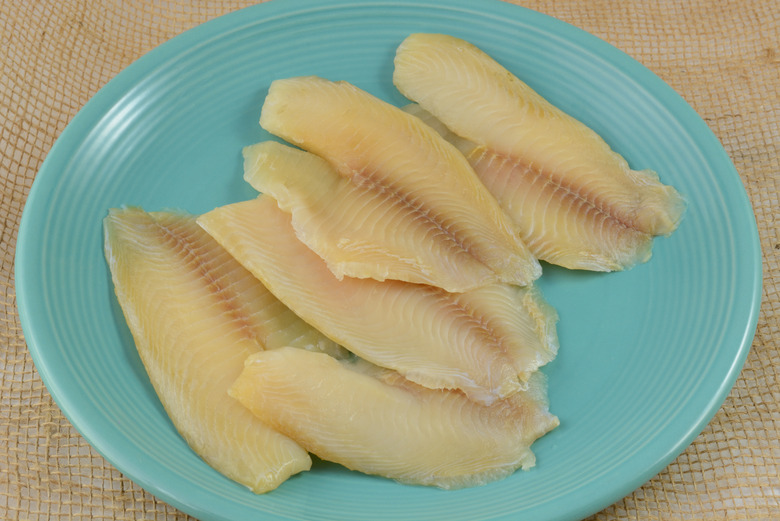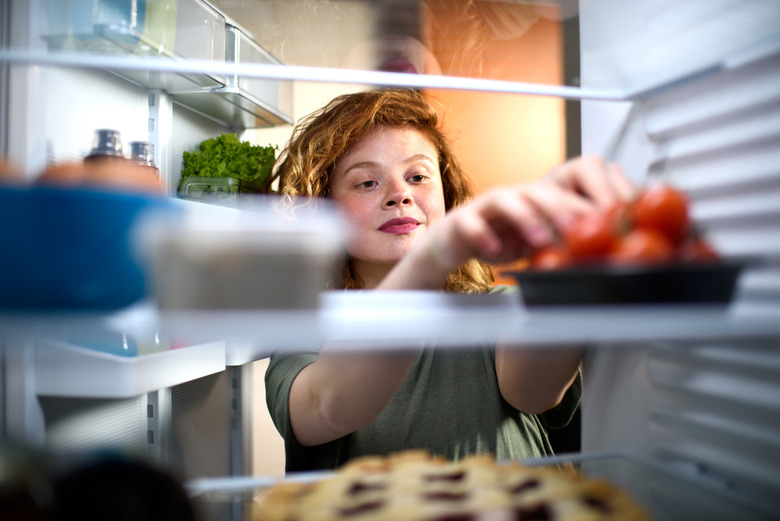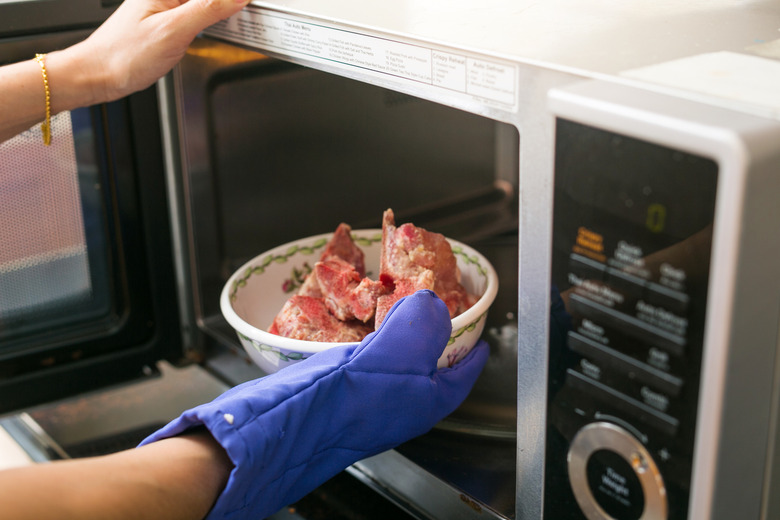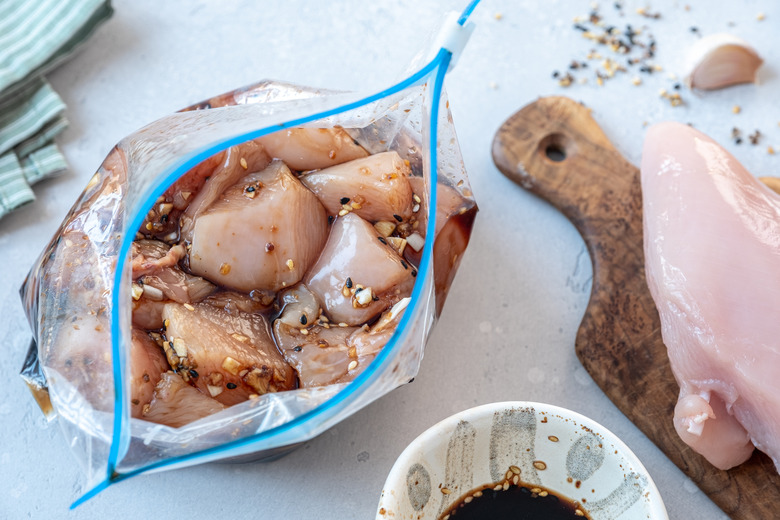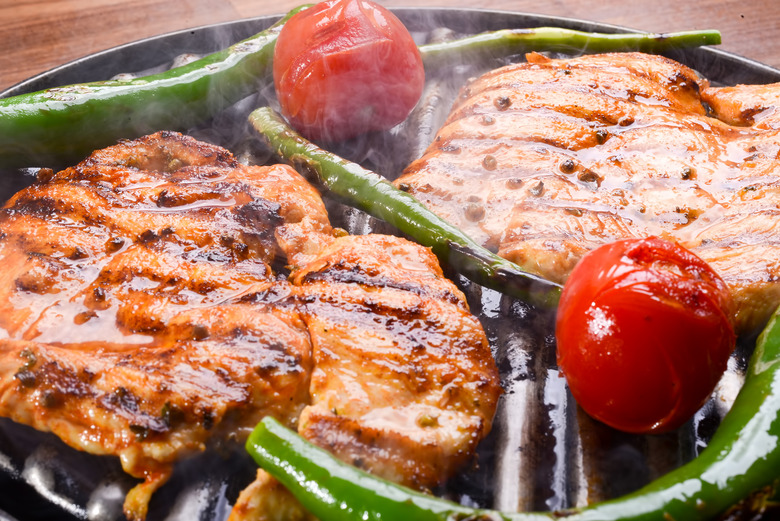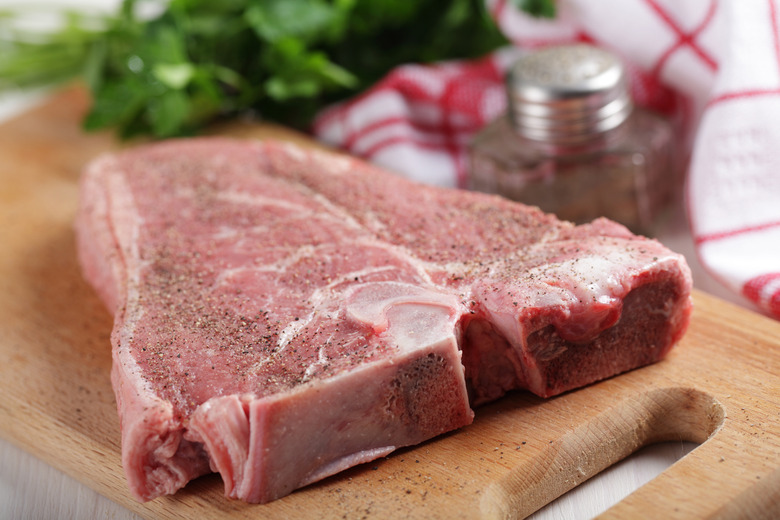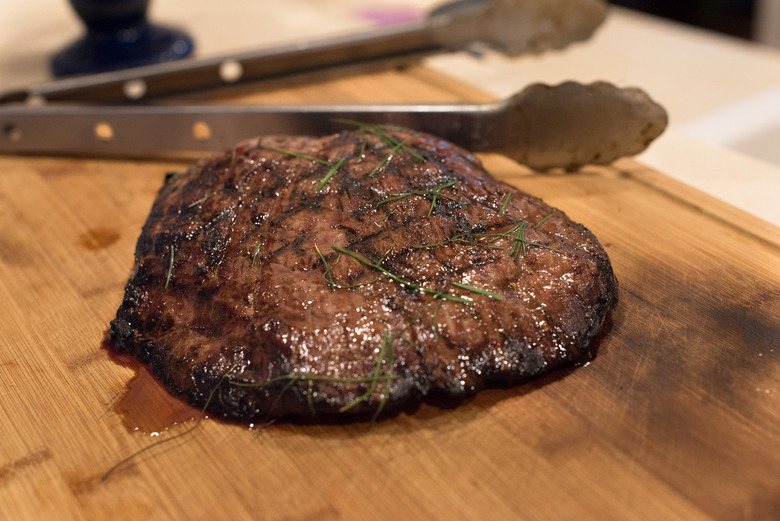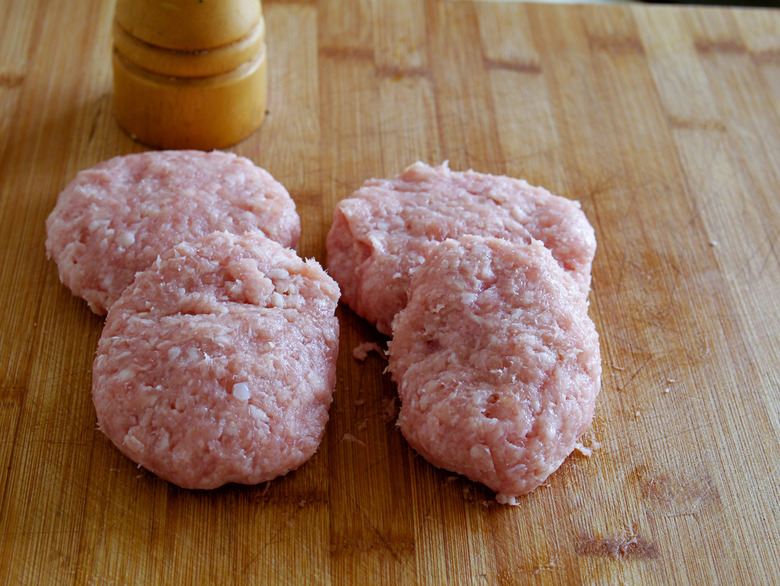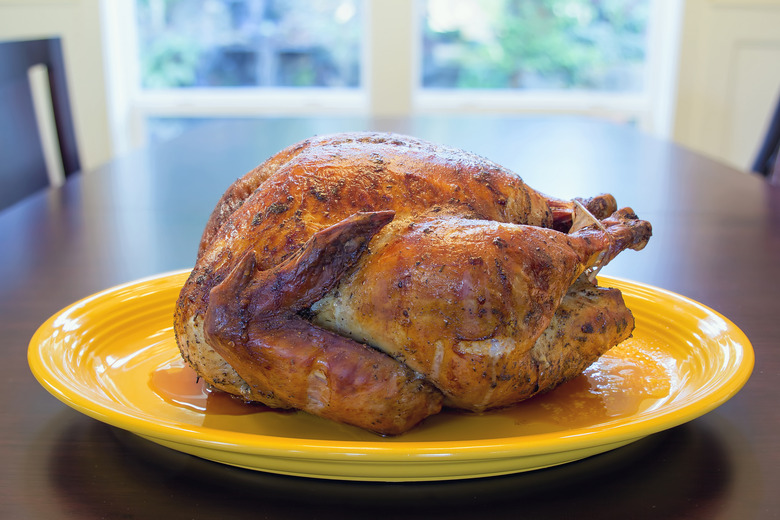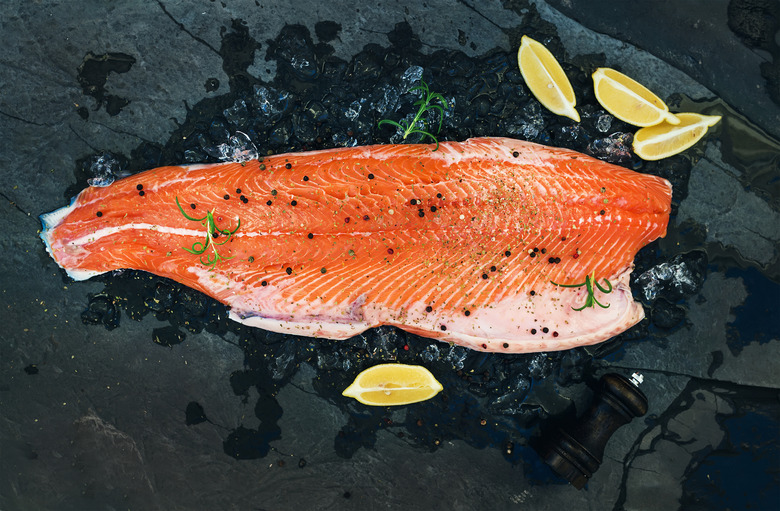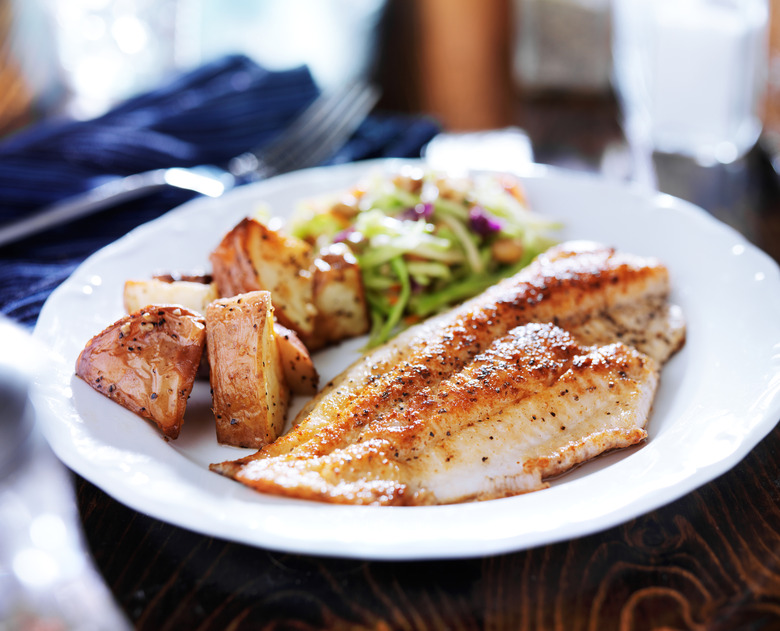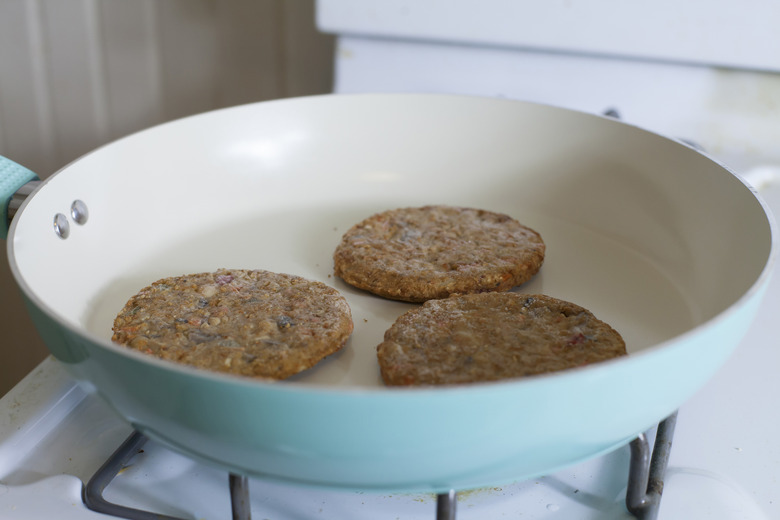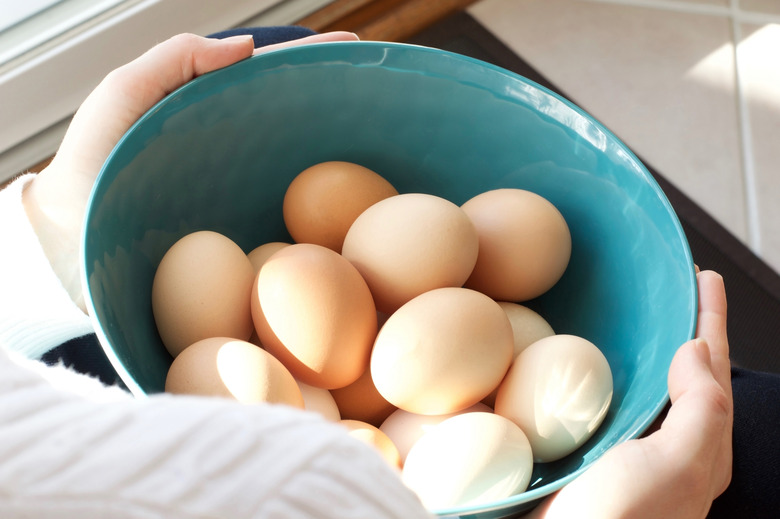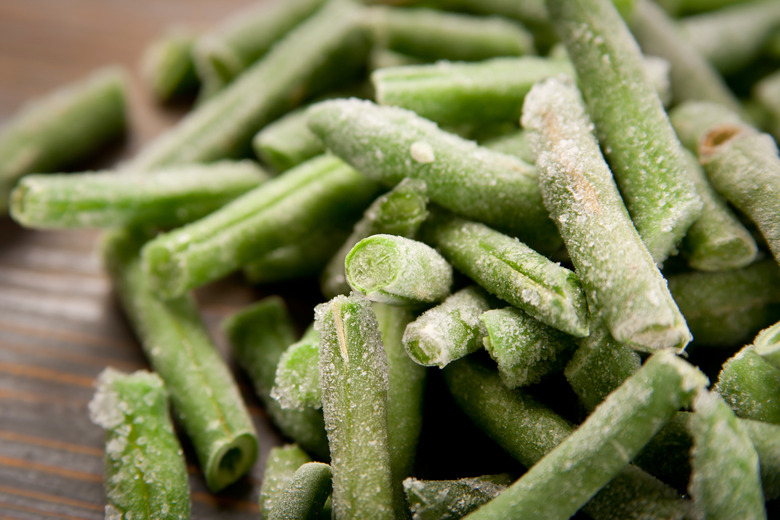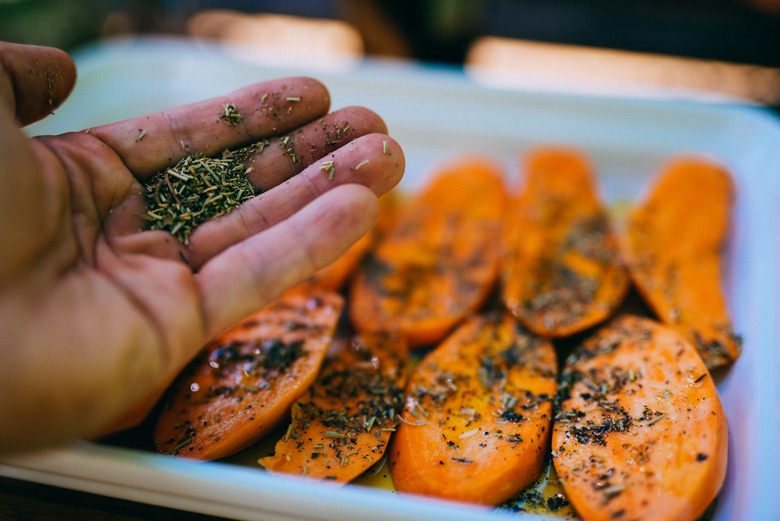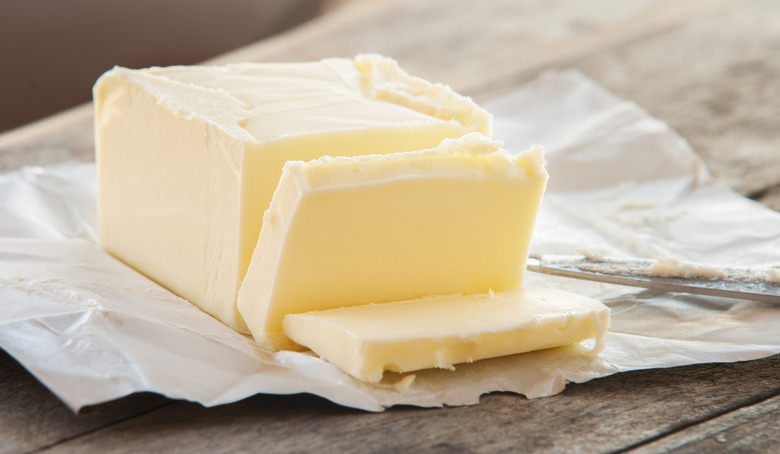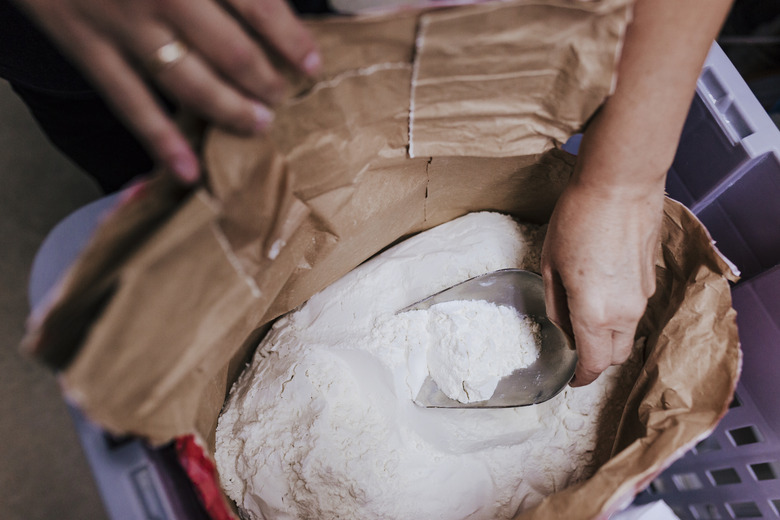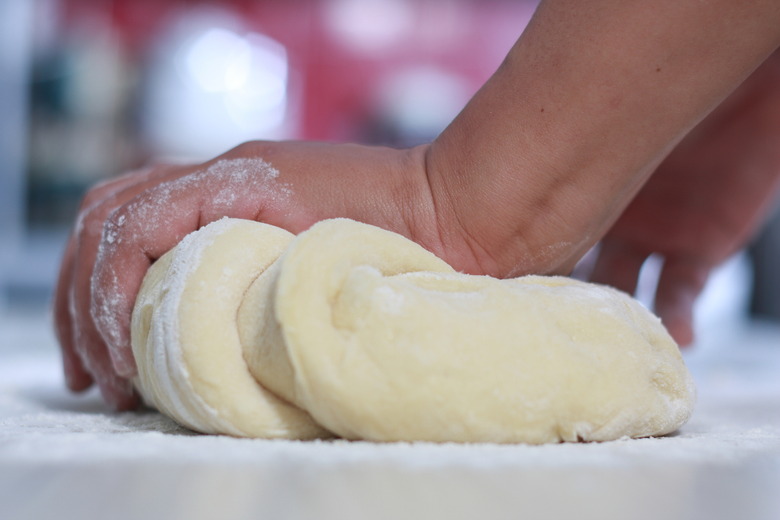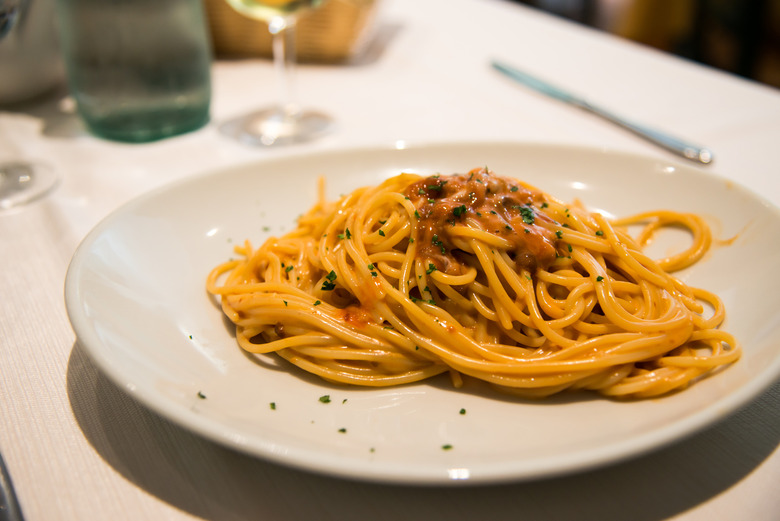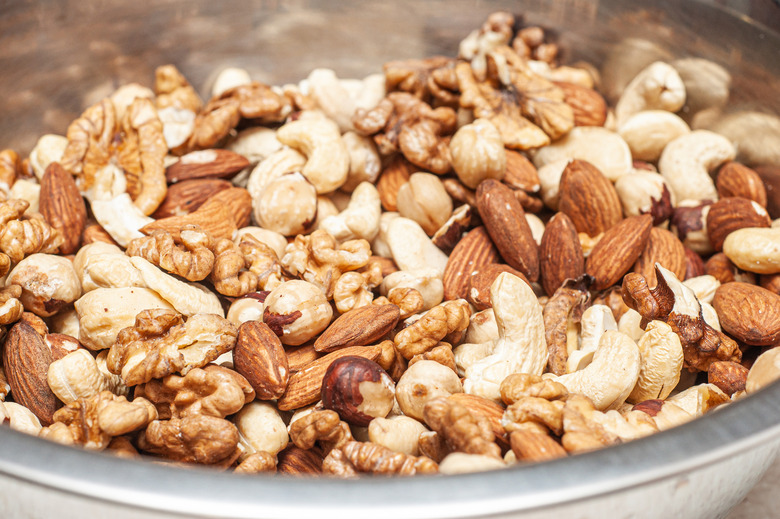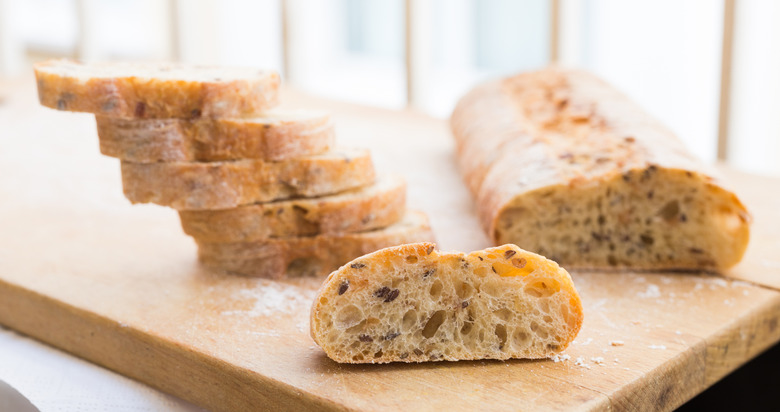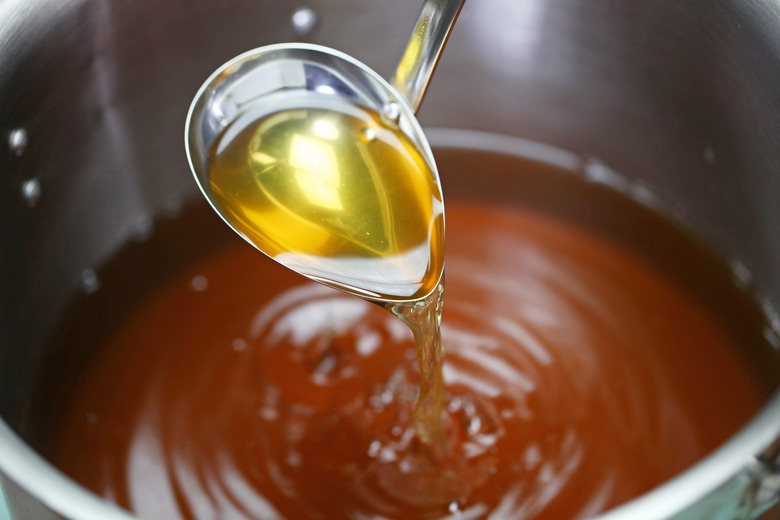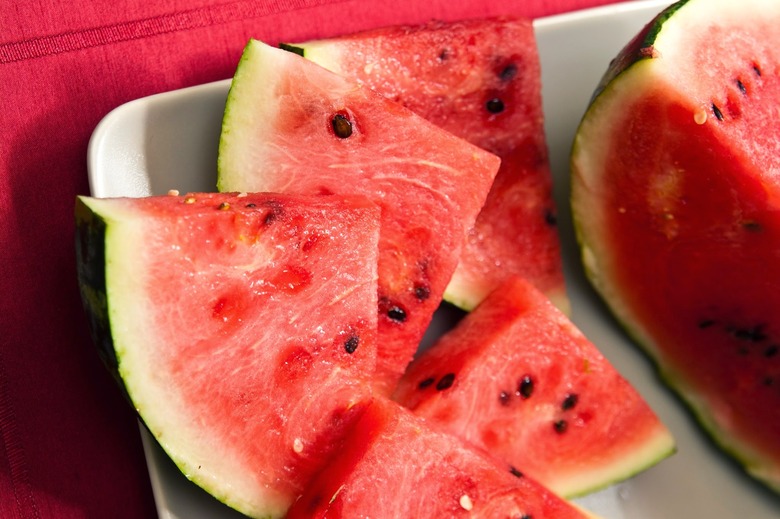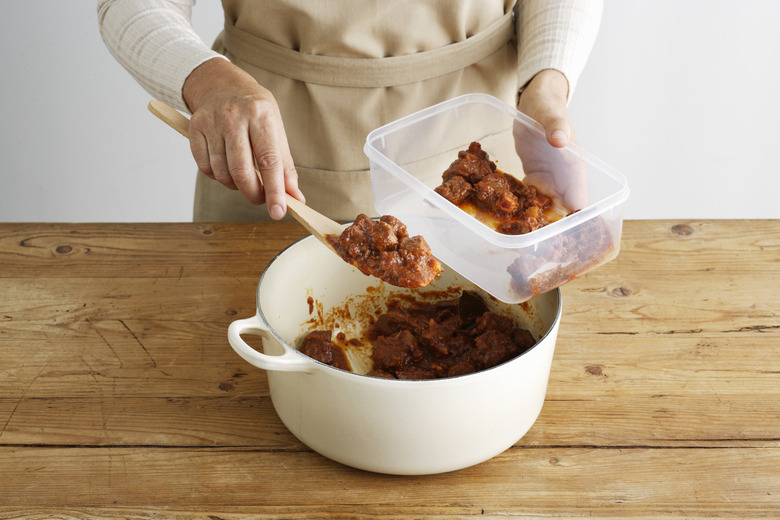How To Thaw Chicken And Other Defrosting Food Questions, Answered
When it comes to cooking, it may feel like there are a lot of rules to follow, bad kitchen habits you need to stop and tricks you should use to make the most satisfying dishes. Cooking is just one part of the food process, though. Storing food, keeping food fresh and ensuring that it's safe to eat are just as important. Freezing and defrosting food may seem simple, but there are proper methods of thawing. Knowing how to defrost specific foods for culinary perfection every time is key, and the following tips will help you safely and deliciously prepare both raw frozen foods and make-ahead meals.
Which freezer temperatures are safe?
Food can do a lot. It can give you energy, it can boost your immunity — and it can give you food poisoning if it's not stored properly. The temperature in your fridge should be at or below 40 degrees Fahrenheit and the temperature in your freezer should be 0 degrees Fahrenheit, according to the U.S. Food and Drug Administration.
What is the ‘danger zone’?
To decrease your chances of food-borne illness, it's best not to let your food get warmer than 40 degrees. The "danger zone" for food, according to the USDA, is between 40 degrees and 140 degrees. These are the temperatures at which bacteria begins to grow.
How to prep food to freeze
Meal prepping for quick and easy dinners is an awesome time-saver. To properly freeze food, place it in air-tight containers, plastic wrap or plastic freezer bags. If you're freezing a meal you've recently cooked, make sure to let the food cool before you place it in the freezer so the internal temperature of the freezer doesn't rise.
Can I cook without thawing?
Some frozen dinners and various foods can be cooked from frozen, while others need to be thawed in order to consume the food without making yourself sick. For instance, you can take frozen strawberries directly out of the freezer to put in your smoothie. Meat that has been frozen can be cooked directly from the freezer either in the stove or in the oven, but the cooking time will need to be increased by about 50%. Never put frozen food directly in a slow-cooker.
Can I just leave frozen meat or fish out on the counter?
Parents know a lot of smart cooking tips, but they don't always do everything right. If yours leave frozen meat on the counter to thaw, encourage them to ditch that habit and quit it yourself too. The Food and Safety Inspection Service (FSIS) says you should never thaw chicken on the counter or in other locations like in the garage or on the porch. The same goes for other meats and perishable foods.
Thawing in the fridge
If you make a lot of home-cooked meals, you probably go through a lot of meat. If you buy in bulk and then freeze some of your meat for meals later in the week, you can place it in the fridge for an easy thaw. Plan ahead, because thawing in the fridge usually takes at least 24 hours. A larger item like a Thanksgiving turkey will take about five days to thaw in the fridge.
Thawing in cold water
Drinking hot water has some health benefits, but thawing food in hot water does not. Similar to leaving meat out on the counter, thawing meat under hot water could lead to bacteria growing on the surface of the meat if it rises above 40 degrees. Instead, keep your meat in a tight plastic bag and submerge it in cold water. You'll need to replace the water every half hour to retain a safe temperature. Smaller cuts may take one to two hours, whereas thicker cuts may take up to three.
Thawing in the microwave
Life gets hectic when you're working from home with kids, and chances are you might forget to take your dinner meats out of the freezer the night before you have to cook it. That's OK because you can safely use your microwave for defrosting. Plan to cook the food immediately after thawing in the microwave since this process causes some areas of the food to begin to cook. Use the defrost feature on your microwave. If there isn't a defrost feature, turn the power level down to 30% and heat for five to nine minutes depending on how thick the meat is.
Raw chicken
Chicken is a great source of protein to supplement your workouts with. If you've taken your raw chicken out of the freezer, you can keep it in the fridge for one to two days before cooking.
Cooked chicken
Cooking a few chicken breasts or thighs at a time is a meal prep hack that will save you tons of time. Another benefit is that you can take frozen cooked chicken out of the freezer and keep it in the fridge for up to 4 days before consuming.
Raw steaks
Before you get into perfectly cooking a steak, this is what you should know about thawing it: the thinner the pieces, the less time it will take to defrost. And, the longer you wait to cook it, the less red it will look. After being frozen, the meat might take on a slightly brown color, but this doesn't mean it's spoiled. You can leave your raw steaks, chops or roasts to thaw in the fridge for three to five days before cooking.
Cooked steaks
If you bought a bunch of steak and cooked it all at once, you can store it in your freezer to eat at a later date. When you remove it to thaw, you have up to four days to reheat and eat it.
Raw turkey
Cooking turkey isn't just for Thanksgiving season. When you place it in the fridge to thaw, know that it should be cooked within one or two days whether it's ground or in whole pieces.
Cooked turkey
Defrosting a raw bird is a lot different than defrosting an already cooked one. Cooked poultry stays fresh in the fridge for three to four days.
Raw fish
Fish such as trout, salmon and sardines are a great way to boost your vitamin D. If you're planning on taking raw fish out of the freezer for lunch or dinner, remember that it only has one to two days of staying fresh so plan on cooking it quickly.
Cooked fish
Grilling salmon is a tasty way to enjoy this delicious fish, and if you made too much and need to freeze some, just place it in an airtight container. When you're ready to thaw it, it can stay in your fridge for up to four days.
Veggie burgers
Some burger are next-level — and to enjoy a veggie burger, you don't even have to thaw it once you've removed it from the freezer. Cook from frozen for about 4 minutes on each side and enjoy. If they're store-bought burgers, be sure to read the packaging for any special instructions.
Eggs
If you don't know how long different foods last in your freezer, you definitely didn't know you can freeze eggs for up to a year. Whether they're egg whites or the whole egg, place them under running cold water or thaw them in the refrigerator overnight. Cook eggs with the yolk in them as soon as they are thawed and cook thoroughly. Egg whites can sit for a half hour before being cooked.
Fruits and veggies
Fruits and vegetables that are frozen will be a bit mushy when thawed. You can defrost them by letting them sit in the fridge, running cold water over them or by warming them in the microwave. If you're using frozen fruits for desserts, they can be used the same as fresh fruit. If you're cooking frozen vegetables, you can cook them without thawing first.
Fresh herbs
Herbs are similar to fruits and veggies in that they are seasonal. When you buy herbs at their peak freshness and want to freeze some for later, you can thaw them, but know that using them to garnish your food might not be ideal because they will appear wilted. Freeze your herbs in oil, and then use them in your recipes without thawing.
Butter
A necessity for bakers, butter can be stored in the freezer to keep it fresh. Some recipes might even call for the butter to be frozen when mixing ingredients to help with texture. If you're not baking with it right away, just keep it in the fridge.
Flour
Flour is a pantry staple, and it can be frozen to retain it's shelf life if you don't use it much. To defrost, let it sit out on the counter to come closer to room temperature.
Homemade dough
Giving in to your carb craving is great until you end up with a ton of extra dough. Thawing the dough to make your next batch of bread doesn't take much. Simply place your frozen dough in the fridge and allow it to thaw for up to 12 hours.
Cooked pasta
Cooking pasta the right way is one thing. But does anyone ever actually cook the right amount of pasta? If you're known to cook too much and you know you won't eat it, store it in the freezer. When you're ready for your next spaghetti and meatball night, reheat the pasta from frozen. Boil water, remove it from the heat and place the chunk of frozen pasta in. Keep it in the pot for one to two minutes and then drain the water.
Nuts
Nuts are a heart-healthy food to add your diet, and they can be frozen to retain freshness. When you're ready to eat the ones you've frozen, remove them from the freezer and allow them to come to room temperature on your counter or in your pantry before chowing down on them.
Bread
If you bought too much bread, you can freeze it to enjoy at a later date rather than letting half the loaf get moldy. To defrost bread, remove it from the freezer and let it sit out on a counter for about an hour (less if it's only a few slices). Once it's come closer to room temperature, heat it in the oven for about five minutes at 350 degrees.
Stock
Whether you're making soup from scratch or making a quick dish out of canned foods, lots of recipes call for stock. If yours is in the freezer, remove it from the plastic bag or packaging it's in, place it in a saucepan with some water and heat on low until thawed.
Foods you shouldn’t freeze
Know that while freezing some foods will save you space in the fridge and allow you to prep things for days you can't make it to the store, there are some foods that you should never freeze. Not only will taste be different, but the quality could change too.
You can make foods last longer
Buying in bulk and freezing raw foods will give you a backup in case you can't get to the grocery store or you know you won't finish eating all that food in one week. Freezing already cooked foods will save you time preparing meals later in the week. Those tricks will save you time from running to the grocery store, but there are other ways to make the most of your food so it lasts longer.
More from The Daily Meal:
Mouthwatering Spins on a Classic Grilled Cheese
Dessert Recipes That Are Difficult But Will Impress
What Food a Dollar Could Buy the Year You Were Born
Easy, Fun Recipes to Make At Home With Kids During Coronavirus Quarantine
